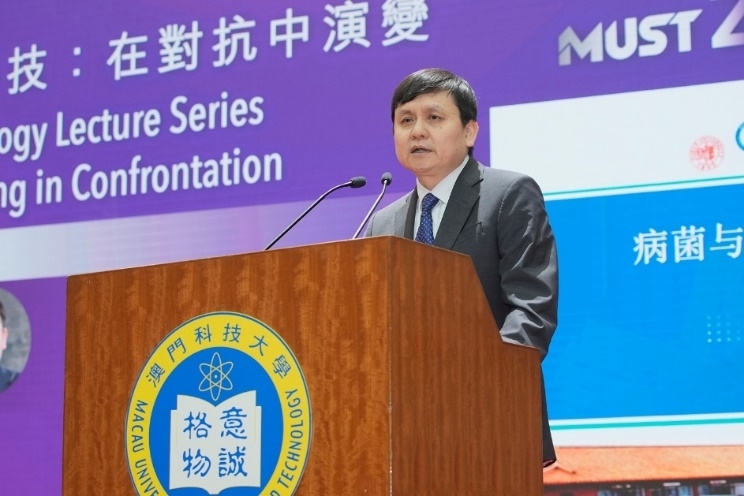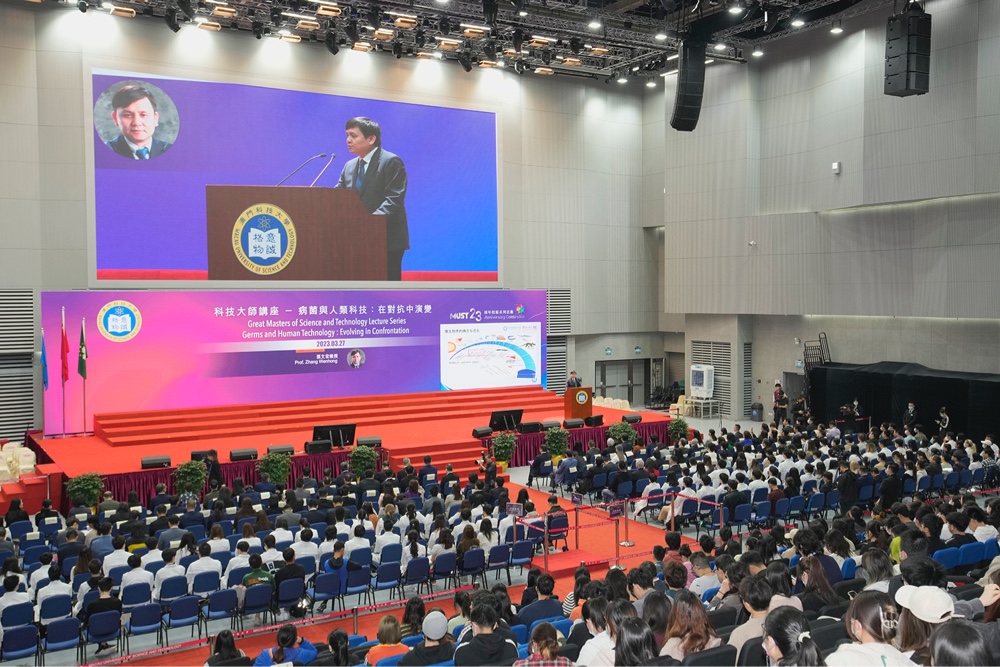As part of a series of events to celebrate the 23rd Anniversary of the Macau University of Science and Technology (M.U.S.T.), a Great Masters of Science and Technology Lecture Series titled “Germs and Human Technology: Evolving in Confrontation” was held at Block R’s Grand Auditorium of M.U.S.T.
We invited Professor Zhang Wenhong, the Director of the National Medical Center for Infectious Diseases; the Head of the Department of Infectious Diseases, Huashan Hospital, Fudan University, and the distinguished Honorary Doctor of Medicine of M.U.S.T. to give a talk. Vice President of M.U.S.T., Chair Prof. Paul Tam welcomed and thanked Professor Zhang Wenhong for giving a keynote speech to our students and teachers. The lecture was simultaneously broadcasted live and on the online platform.

Professor Zhang Wenhong
Attending guests included the representatives of the Liaison Office of the Central People's Government of Macao, the mainland government and universities from China; enterprises and secondary schools from Hong Kong; local government officials, universities, secondary schools, banks, hotels, enterprises, and associations; Liu Chak Wan, Chancellor of M.U.S.T.; Tong Ka Lok, Vice President of M.U.S.T.; Chen Ji-Min, General Secretary of M.U.S.T Council; Su Hsiang Mei, Council member of M.U.S.T.; members of the M.U.S.T. Advisory Committee, and representatives of faculties and institutes, teachers, and students.
Professor Zhang highlighted that the development of human beings goes hand in hand with the evolution of microorganisms. As human beings left Africa and entered the agricultural society, the gathering of people promoted the birth and spread of infectious diseases. The occurrence and development of influenza, COVID-19, smallpox, AIDS, cholera, plague, tuberculosis, etc, were all closely related to human activities and social evolution. Through herd immunity and changes in the living environment, humans have coexisted with microorganisms since the Middle Ages. With the Scientific Renaissance after the Middle Ages, especially the development of medical science since the 18th century, human beings began to rely on technology to tackle the threats and challenges of the microbial world. From the pandemic to the local epidemic, the establishment of human natural immune barriers, the advent of antimicrobial drugs, to the current treatment utilizing targeted small molecule antiviral drugs, and the decoding of the whole gene through high-throughput sequencing technology. Lastly, Professor Zhang pointed out that the species that can survive may not be the strongest or the most intelligent, but those that can respond rapidly to changes.

On-site at the lecture
During the Q&A session, Professor Zhang interactively answered students' questions on "what can we do from now on to build a better public health system" and "future development plans for medical students". Professor Zhang believes that the key points in the fight against diseases are technological development, rapid response, and solidarity. He also mentioned that human beings must maintain a humble heart while science and technology advance. In addition, he encouraged the students by sharing that “Maybe we are not the smartest group, but as long as we study hard, gradually accumulate knowledge, and progress slowly, I believe that hard work is greater than talent.”




